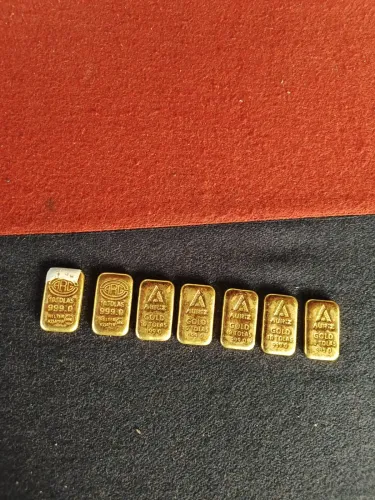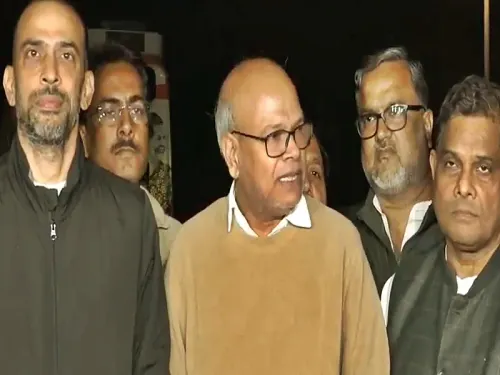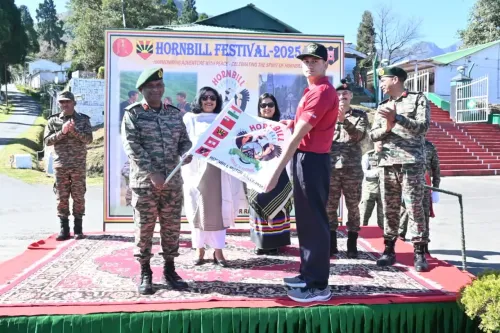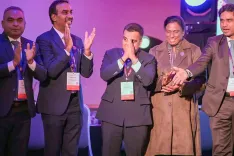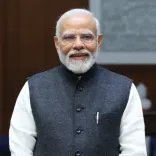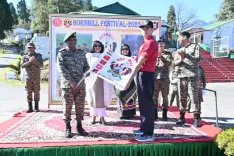Giorgia Meloni: A Vision Beyond Slogans, Strengthening the India-Italy Alliance, Says Italian Ambassador Antonio Bartoli (IANS Interview)
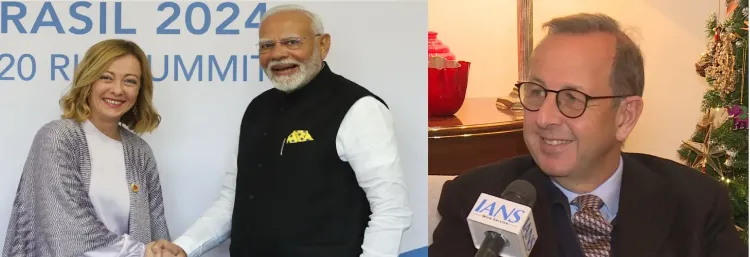
New Delhi, Dec 14 (NationPress) As India and Italy foster deeper collaboration in numerous sectors, including defence and security, science and technology, space, clean energy, migration, and mobility, Antonio Bartoli, the Italian Ambassador to India, engaged in an exclusive conversation with IANS about the promising future and how the strong ties between the esteemed leaders of the two nations - Prime Minister Narendra Modi and Italian PM Giorgia Meloni - are continually evolving.
Excerpts:
IANS: Recently, Italian Prime Minister Giorgia Meloni was recognized as 'Europe's most powerful person', reflecting her increasing influence in the region and beyond. What are your thoughts on this?
Antonio Bartoli: A significant aspect of her (Meloni's) leadership is her coherence and determination. Her administration is among the most stable in Europe, and arguably globally, especially during a time when political leadership shifts swiftly. Meloni's coalition has remained consistent for nearly three decades, showcasing strong leadership traits akin to those of PM Modi. This shared leadership style fosters personal chemistry, which is essential in today's political landscape, enhancing state relationships and propelling our bilateral ties forward with exceptional intensity.
IANS: With numerous high-level meetings occurring this year, including recent ones, how do you perceive the current phase for India-Italy relations?
Antonio Bartoli: The meeting between PM Meloni and PM Modi on November 18, alongside the G20 summit in Rio, resulted in the signing of a joint action plan. This plan outlines a concrete and determined strategy to enhance the strategic partnership established between India and Italy. They have pinpointed ten pivotal areas of collaboration, starting with political dialogue. For example, Minister of External Affairs S. Jaishankar's visit to Italy for the G7 and MED Dialogues was followed by our Minister of Industry's visit, and soon our Deputy Prime Minister will participate in a major business forum, followed by our Defence Minister. This structured political dialogue encompasses priority sectors such as space, defence, connectivity, energy transition, security, mobility, and science and technology. There is an abundance of work ahead, and we are committed to it!
IANS: The Modi-led government has emphasized connectivity over the past decade. Do you believe that the India-Middle East-Europe Economic Corridor (IMEEC), of which India and Italy are founding members, could be transformative in the future?
Antonio Bartoli: Representing a vision rooted in history is a privilege. India and Rome have engaged in trade for millennia. For instance, black pepper was sought by the King of Visigoths as ransom, highlighting its value. We are revitalizing this historic perspective. The corridor will traverse the Middle East, a region currently facing turmoil, but we maintain a vision for future shared prosperity that could contribute to stability and peace. Italy is poised to be the natural endpoint of this corridor, especially with ports like Trieste, which serve as gateways to Europe, particularly Central and Eastern Europe. We are also pursuing a ports collaboration agreement with India, which could be crucial in the future.
IANS: Last year, Defence Minister Rajnath Singh's visit to Rome resulted in positive discussions with his Italian counterpart, Guido Crosetto, regarding enhanced partnerships as India pushes 'Make in India, Make for World'. What progress has been made since?
Antonio Bartoli: Defence and space are primary focuses of the India-Italy Joint Strategic Action Plan. This commitment indicates a growing presence in the Indo-Pacific region. Recently, the Italian ship Amerigo Vespucci visited Mumbai, marking its third port call in India within 18 months, underscoring Italy's dedication to the Indo-Pacific. In October, a Joint Strike Carrier Group, featuring the main aircraft carrier of the Italian navy, Cavour, and frigate Alpino, conducted joint exercises in India. The 'Make in India' initiative extends to the defence sector, with our defence industries eager to relocate some production and develop co-design and co-production projects with Indian firms. The next step is to identify these areas and proceed.
IANS: The Meloni-led government emphasizes shared respect between Italy and India. Is this mutual understanding strengthening ties more than ever?
Antonio Bartoli: Respect is crucial, but it goes beyond that; there is a shared understanding of not patronizing any nation. Both countries acknowledge the importance of pursuing their national interests without being confined by predetermined ideologies. This shared perspective allows Italy to advance its agenda within the European Union while India positions itself as a global player. Our mutual respect extends to our approach toward Africa, exemplified by our ambitious 'Piano Mattei' plan, inspired by a visionary entrepreneur in Italy's oil and gas sector who advocated for respectful, peer-to-peer relationships with African nations. Together, we can initiate collaborative investment projects. Ultimately, our goal is to develop joint projects based on mutual respect and understanding, as demonstrated by the increasing intensity of our relations. The hashtag Melodi symbolizes a shared vision and reflects the frequency of meetings between our leaders.
IANS: The Indian diaspora significantly contributes to Italy's economic growth. How impactful is the Indian community, now estimated at over two lakh, in Italy?
Antonio Bartoli: The Indian community is well-integrated and has faced minimal issues. Historical communities, such as the Sikh population, played vital roles in Italy's liberation from fascism and are active in agriculture, industry, and restoration. Overall, Indians are hardworking and well-integrated. We aim to enhance their numbers and skills by attracting newcomers with professional qualifications. The mobility agreement is crucial for this win-win situation, addressing labor market gaps in Italy. Our pilot project focuses on recruiting nurses since we require 65,000 nurses in Italy. We will provide Italian language training for prospective nurses, ensuring their linguistic and professional competencies are certified before bringing them to Italy.
IANS: Having arrived in New Delhi only in July, what has your experience been regarding the strengthening relations between the two countries?
Antonio Bartoli: Many diplomats express this, but I genuinely believe we share remarkable similarities despite geographical distance. We have common values despite different religions, and both cultures celebrate significant festivals like Christmas and Diwali, symbolizing light and the triumph of good over evil. Both nations value friendship, family, and culinary traditions, which serve as catalysts for building connections. This foundation allows us to pursue national interests while simultaneously embracing our rich cultural heritages. As ancient civilizations, we possess inherent complementarities; India seeks to enhance its manufacturing capabilities while Italy excels in industrial strength. Our trade relations are further strengthened by our geographical positioning as two peninsulas, contributing to our mutual interest in stability, connectivity, and the Indo-Pacific, which connects to the Mediterranean. The IMEEC encompasses not just railways and ships but also a digital corridor, with Telecom Sparkle completing a cable connecting Mumbai to Geneva and Singapore, establishing a high-speed data highway to enhance connectivity. Our historical ties are deeply rooted in the past while looking ahead to a promising future.
IANS: Having transitioned from journalism to a diplomatic career, including a tenure at the US State Department, how do you view India's recent rise, particularly under PM Narendra Modi's leadership?
Antonio Bartoli: Let's begin with the leadership. Modi is an exceptional political figure. Opinions may vary, but his unparalleled ability to connect with people is evident. His active social media presence and capacity to craft a compelling narrative are essential for any leader, particularly regarding the ambitious objectives set for 2047. India's progress across all sectors is noticeable. While economic growth is apparent, challenges remain. However, India's youthful median age of 28 and a solid educational foundation create a favorable environment for growth. These factors, combined with India's status as a vibrant democracy, align with the values we share in Italy and Europe, fostering our desire for deeper partnerships.
IANS: Given Italy's football heritage, are there plans for further collaboration between the two nations in sports?
Antonio Bartoli: Absolutely! I strongly believe in the power of sports diplomacy as a means to forge connections. Although cricket isn't widely played in Italy, we recognize the burgeoning football fanbase in India. We aim to facilitate exchanges of youth coaches from our A-series teams to train underprivileged kids in summer camps, culminating in a tournament that provides these children with enriching experiences and the chance to discover new talents. Italian football legends, like Alessandro Del Piero, have previously engaged with Indian audiences, and we can leverage their influence to kickstart this initiative.
IANS: Another area for collaboration between India and Italy is tourism, especially with Bollywood films being shot in picturesque locations...
Antonio Bartoli: The rising prominence of India and its leadership in soft power is noteworthy. India's extensive diaspora holds significant political and economic weight in various countries. Bollywood films present an exciting opportunity for us, as Italy is renowned for its breathtaking landscapes and cultural heritage. With diverse attractions, from lakes and coastlines to majestic mountains and historic cities, we represent a treasure trove of beauty. Both nations have immense potential for tourism exchanges, as we currently underutilize opportunities for Italian tourism in India and vice versa. Our goal is to encourage not just film productions but also other sectors, such as weddings, cycling tours, and luxury brands. Italy's multifaceted cultural offerings, coupled with our daily direct flights from Milan and Rome, present a unique opportunity for fostering deeper connections.
IANS: With the recent shift in U.S. leadership, do you envision India, Italy, and the U.S. collaborating in various sectors?
Antonio Bartoli: Certainly! A shared vision unites us. While Trump may adopt a more demanding stance toward Europe, it is essential for Europe to enhance its strategic capabilities while valuing its partnership with the U.S. in the transatlantic bond. In defense and other sectors, autonomy and collaboration are crucial. The new U.S. president's approach could provide opportunities for India, particularly as Trump revitalized the Quad. His flexibility regarding Russia and assertiveness toward China, coupled with potential tariff advantages for India, indicates that our nations are well-positioned to collaborate effectively.

